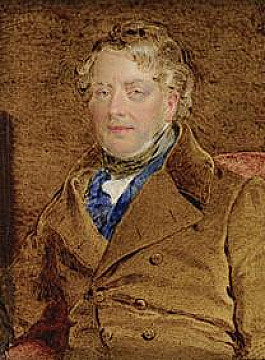Edward Ellice (1783-1863)
Edward "The Bear" Ellice, M.P., P.C., of Wyke House, Middlesex
He was born at London and educated at Winchester School and Marischal College, Aberdeen. His family were heavily involved in imports/exports between New York, Montreal, and London and regularly "commuted" between the latter two. He became a partner in the firm of Phyn, Ellice & Inglis and was sent to Montreal in 1803. After the death of Simon McTavish the following year, he became a partner in the fur-trading North West Company with the McGillivray brothers. In 1805, he inherited his father's vast Seigneury de Villechauve (aka Beauharnais) in Quebec that was managed on his behalf by Phyn's nephews, Forsyth, Richardson & Co., of Montreal. He was the spokesman for the “Canada Trade” in England, co-founding the still extent Canada Club in London. After a bitter power-struggle between the Northwest Company of Montreal and Lord Selkirk's Hudson's Bay Company, Ellice played an important role in their amalgamation (1821) and became Deputy-Governor of the Hudson's Bay Company.
In England, he was elected as a Whig M.P., for Coventry; Financial Secretary to the Treasury (1830-1832); Chief Whip in Lord Grey's Government (1830-1832); Secretary of War (1832-1834); and, a Privy Counsellor in 1833. He was instrumental in seeing the Reform Act of 1832 passed and co-founded the Reform Club. He owned eight sugar plantations in the West Indies and when his 300-slaves were emancipated he received £35,000 in compensation. He was married twice: (1) In 1809, Hannah Althea Grey, daughter of the 1st Earl Grey. (2) In 1843, Anne Amelia Keppel, daughter of the 4th Earl of Albermarle. He lived at Wyke House on Sion Hill near Brentford, Middlesex. He was survived by one son, Edward Ellice Jr., from his first marriage. The Ellice Islands in Polynesia were named for him and are now the independent nation of Tuvalu.
In England, he was elected as a Whig M.P., for Coventry; Financial Secretary to the Treasury (1830-1832); Chief Whip in Lord Grey's Government (1830-1832); Secretary of War (1832-1834); and, a Privy Counsellor in 1833. He was instrumental in seeing the Reform Act of 1832 passed and co-founded the Reform Club. He owned eight sugar plantations in the West Indies and when his 300-slaves were emancipated he received £35,000 in compensation. He was married twice: (1) In 1809, Hannah Althea Grey, daughter of the 1st Earl Grey. (2) In 1843, Anne Amelia Keppel, daughter of the 4th Earl of Albermarle. He lived at Wyke House on Sion Hill near Brentford, Middlesex. He was survived by one son, Edward Ellice Jr., from his first marriage. The Ellice Islands in Polynesia were named for him and are now the independent nation of Tuvalu.




